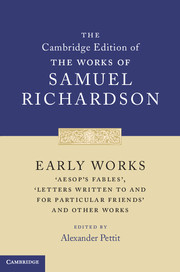Book contents
- Frontmatter
- Dedication
- Contents
- General Editors’ Preface
- Acknowledgements
- Chronology
- List of Abbreviations
- General Introduction
- Textual Introduction
- The Apprentice’s Vade Mecum (1733)
- A Seasonable Examination of the Pleas and Pretensions (1735)
- Preface to Aubin, A Collection of Entertaining Histories and Novels (1739)
- Aesop’s Fables (1739)
- Letters Written to and for Particular Friends (1741)
- Six Original Letters Upon Duelling (1765)
- Appendix: The Infidel Convicted (1731)
- Postscript
- Emendations
- Word-division
- Bibliographical Descriptions of Early Editions
- Explanatory Notes
- Index
Letter CLXXIII
Published online by Cambridge University Press: 30 June 2022
- Frontmatter
- Dedication
- Contents
- General Editors’ Preface
- Acknowledgements
- Chronology
- List of Abbreviations
- General Introduction
- Textual Introduction
- The Apprentice’s Vade Mecum (1733)
- A Seasonable Examination of the Pleas and Pretensions (1735)
- Preface to Aubin, A Collection of Entertaining Histories and Novels (1739)
- Aesop’s Fables (1739)
- Letters Written to and for Particular Friends (1741)
- Six Original Letters Upon Duelling (1765)
- Appendix: The Infidel Convicted (1731)
- Postscript
- Emendations
- Word-division
- Bibliographical Descriptions of Early Editions
- Explanatory Notes
- Index
Summary
To a Widow on the Death of her Husband.
Good Madam,
Allow me the Liberty of condoling with you on the truly great and heavy Loss you have sustain’d of an excellent Husband. All we, who had the Pleasure of his Friendship, mourn with you, the irretrievable Misfortune to us as well as to you. But as there is no recalling it, and as it is God's doing, we must not repine at the Dispensation, but acquiesce in it. And yet to say, that neither you nor we ought to grieve for it, would be absurd and unnatural. Sinful Grief, however, we are commanded to shun: And we ought to bless God, that he was graciously pleased to continue him with us so long instead of mourning too heavily, that we had not longer the Pleasure of his agreeable Conversation. We were not born together, and some of us must have gone first; and I have sometimes been ready to think, (besides the Life of Glory, that, thro’ God's Mercies, awaits the Good) that he is far happier, than those he leaves behind him, in this Point, That he is saved from the Regret (which fills the wounded Hearts of his surviving Friends) of seeing them go before him, as they have seen him go before them. Had he not dy’d now, a few Years would have determin’d his useful Life; for the longest Life is but a Span; and then the Matter, had he gone before us, would have been as it is now.
We may make our own Lives miserable in bewailing his Loss; but we cannot do him good, nor (were he to know it) Pleasure. You, in particular, Madam, who are now called upon to be both Father and Mother to the dear Pledges of your mutual Affection, ought to take double Care, how you suffer immoderate Grief to incapacitate you from this new, and more arduous and necessary Task. For by this means, you would not only do yourself Hurt, but double the Loss which his dear Children have already sustain’d in that of their Father. And would you, Madam, make them motherless as well as fatherless?—God forbid! Consider, tho’ this is a heavy Case, yet it is a common Case. And we must not repine, that God Almighty thought him ripe for Heaven, and put an End to his probatory State.
- Type
- Chapter
- Information
- Early Works'Aesop's Fables', 'Letters Written to and for Particular Friends' and Other Works, pp. 524 - 526Publisher: Cambridge University PressPrint publication year: 2011

